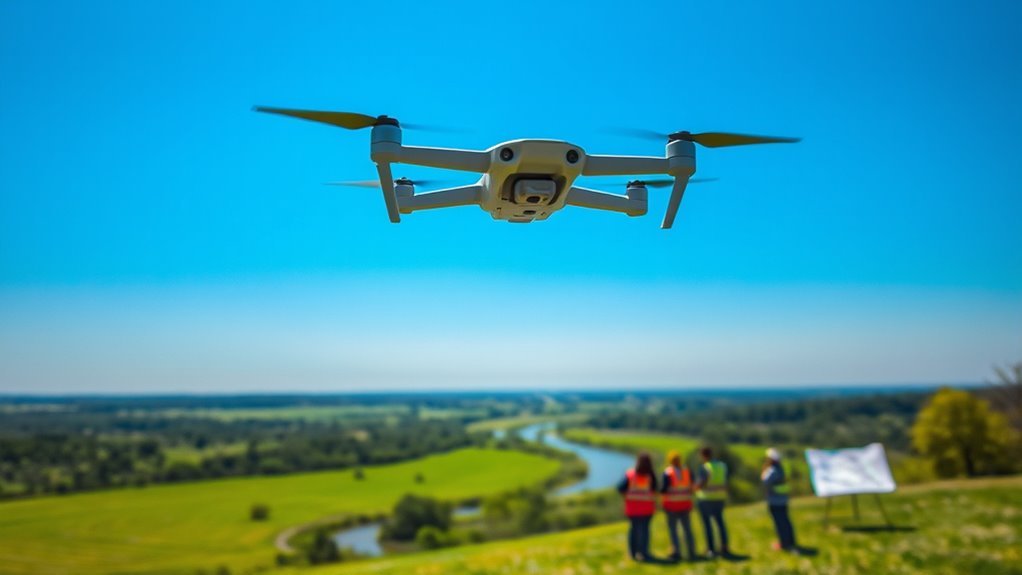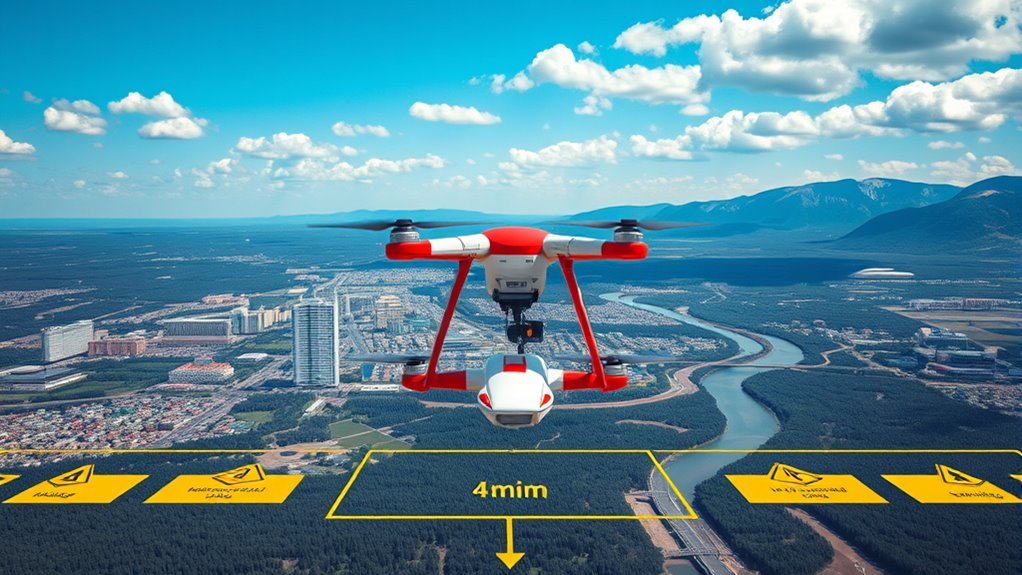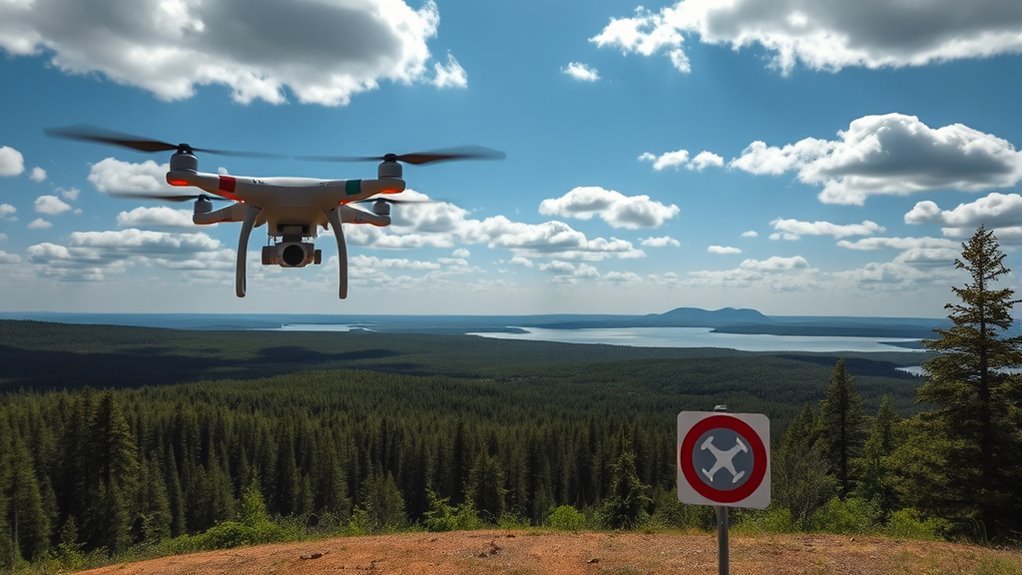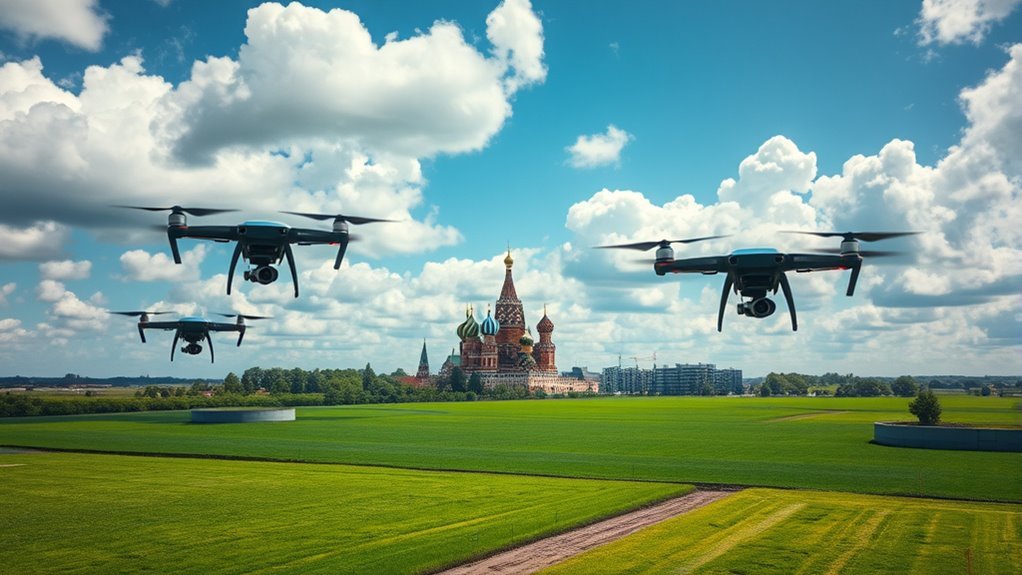If you plan to operate a drone in Russia, you must register drones over 250 grams with the Federal Air Transport Agency and obtain the appropriate pilot license. You’re required to follow strict operational limits, such as flying below 120 meters and maintaining visual line of sight. Be aware of no-fly zones over urban areas, airports, military sites, and government buildings. Privacy laws restrict data collection without consent. Violations carry fines and license suspensions. Further details clarify these essential requirements.
Drone Registration Requirements in Russia

In Russia, all drones weighing over 250 grams must be registered with the Federal Air Transport Agency. You’ll need to complete the drone registration process online, providing detailed information about the drone and its operator. This process is designed to guarantee accountability while respecting your right to operate freely within legal boundaries. Registration fees are applicable and vary depending on the drone’s specifications; these fees support regulatory oversight and airspace management. Once registered, you’ll receive an identification number that must be visibly affixed to your drone. By complying with these requirements, you maintain your ability to fly responsibly and legally, safeguarding both your freedom and public safety. Understanding and adhering to the drone registration process is essential for all drone operators in Russia.
Restricted and No-Fly Zones

Although drone registration is mandatory, understanding where you can and cannot fly is equally critical. Restricted and no-fly zones in Russia primarily include urban areas, military installations, government buildings, and airports. These zones guarantee safety and national security while balancing your freedom to operate drones responsibly. Violating these restrictions can result in penalties.
| Zone Type | Description | Restrictions |
|---|---|---|
| Urban Areas | Densely populated city regions | Flight prohibited above 50 meters |
| Military Installations | Sensitive defense locations | No drone operations allowed |
| Airports | Air traffic hubs | Complete flight ban within 5 km |
| Government Buildings | Key administrative centers | No drone activity permitted |
Always consult updated maps before flight to maintain compliance and avoid infringements.
Pilot Licensing and Operational Limits

Since operating a drone involves significant responsibility, you’ll need to obtain the appropriate pilot license to assure compliance with Russian regulations. This licensing requires completing rigorous pilot training designed to guarantee operational safety and proficiency. You’ll be assessed on your knowledge of aviation rules, navigation, and emergency procedures. Operational limits include restrictions on maximum altitude, typically capped at 120 meters, and maintaining visual line of sight at all times. You must also adhere to weight classifications that affect licensing requirements. These measures balance your freedom to fly with the imperative of safety in shared airspace. By fulfilling these criteria, you demonstrate your capability to operate drones responsibly, minimizing risks and respecting regulatory frameworks established to protect both public interests and your rights as a pilot.
Privacy and Data Protection Laws
Meeting pilot licensing and operational standards is only part of your responsibility as a drone operator in Russia; protecting privacy and managing data are equally regulated. You must navigate laws addressing data collection and surveillance concerns to uphold individual freedoms. Unauthorized recording or sharing of personal data is prohibited, emphasizing your duty to respect privacy.
| Aspect | Requirement | Implication |
|---|---|---|
| Data Collection | Consent needed for private areas | Limits intrusive surveillance |
| Data Storage | Secure handling mandated | Protects against data breaches |
| Usage Restrictions | Prohibits sharing without consent | Guarantees data protection |
| Surveillance | Restricted in sensitive zones | Safeguards civil liberties |
Penalties for Violating Drone Regulations
When you fail to comply with Russia’s drone regulations, you face a range of penalties designed to enforce safety, privacy, and security standards. The fines imposed for violations can vary greatly depending on the nature and severity of the infraction, with monetary penalties serving as a primary deterrent. Enforcement actions may also include temporary suspension or permanent revocation of your drone operator license. In cases involving unauthorized flights over restricted zones, you risk seizure of your drone and potential criminal charges. These measures guarantee that drone use respects national security and individual privacy without undue restriction on your freedom to operate. Understanding these penalties helps you navigate the regulatory landscape responsibly while maintaining your rights as a drone pilot in Russia.

